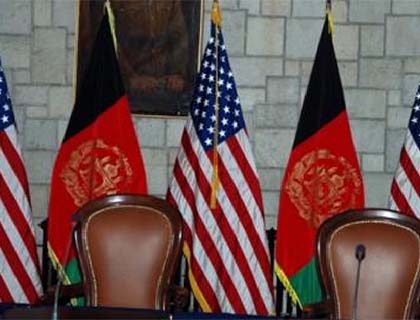President Karzia’s stance on the much-awaited security agreement between Afghanistan and the United States has left him under severe criticisms from ordinary citizens to politicians, diplomats and lawmakers. Despite both the Afghan government officials and the US have remained cautious in recent days not to further exacerbate the situation, the United States and NATO have maintained the position that the Afghan President is risking the post-2014 partnership. NATO Chief Anders Fogh Rasmussen said in Brussels that it would have to consider pulling out all its troops out of Afghanistan if Afghanistan’s president fails to sign the security agreement with the United States. However, NATO General Secretary maintained that the military organization hasn’t set any deadline for the Afghanistan to sign the agreement with Washington.
The latest remarks by NATO chief is suggesting that the West is going to choose remaining patient on signing of the security agreement between Afghanistan and the United States, while continuing Afghan President Hamid Karzai to end his approach to a deal that is already endorsed by the assembly of Afghan elders, the Loya Jirga. It seems the US and NATO are gradually coming to realize that perhaps the best tactic against Karzai’s ever-shifting positions is to not going out of the game and wait for the right time while continuing pressures on the Afghan president. With Rasmussen’s remarks, there is now a glimpse of optimism that the US hopefully would not risk the entire mission by going to consider a complete withdrawal of forces from Afghanistan.
Many consider Karzai’s insistence on not signing the agreement on time, as demanded by the US and the Afghan Loya Jirga, as potentially deal breaker which could lead the US towards considering an unlikely but not impossible ‘zero option’ for its troop presence in Afghanistan beyond 2014. In recent weeks, Iran and the Taliban – and perhaps some within circles of the Afghan politics and government – have specifically became vocal and active in calling the Afghan president not to sign the security agreement with Washington or even some urging to reject it altogether. On the other hand, there is also a loud voice in Washington, in the US political spectrum and the media, in favor of a complete withdrawal from Afghanistan. Also in Afghanistan and the region, there are spoilers who are now actively seeking to take advantage of the situation.
This is how the trend is going in a wrong way: President Karzai is now warmly called on by the Taliban and perhaps others not to secure a long-term partnership between Afghanistan and the US. The militant groups and other spoilers in the region and possibly within the Afghan government are attempting to tempt Karzai for not signing the deal in exchange for starting a peace negotiation that, for sure, will go nowhere given the past attempts of the Afghan government in making overtures to the Taliban. As Hamid Karzai is preparing for a regional visit to Iran and India, it remains unclear if he is intended to continue the standoff despite that he recently softened his conditions for signing the agreement.
Karzai’s motive, however, is also unclear to many. While some believe that he is concerned with his own status and power as well as family influence after he steps down from Afghanistan’s presidency, others maintain that the Afghan president is fearful of signing a deal that would allow thousands of US presence to stay in Afghanistan. True that he might be concerned on how to be viewed by history, but the question remains unanswered what legacy he would leave behind if he fails a deal with the United States at all, given the country’s financial and military dependence on sustained support of the international community. The fact that he is refusing to sign the agreement approved by a Jirga organized and advocated by him is further complicating the confusions. If he intended to garner public support for signing the agreement in order to avoid taking responsibility alone, then what can be the reasons for his refusal to sign the security agreement, if there are no other motives behind the scene?
Recently, the Afghan government said that the NATO and the United States have cut supplies of fuel and other equipments to Afghanistan’s security forces. However, the US denied it and said it was puzzled by the news. It still remains a mystery whether NATO cut supplies to Afghan forces’ units or the Afghan government used it as a tactic to mould the thoughts and sentiments of the public already disappointed of the confrontation going on between Afghanistan and the United States. However, what is clear is that it would certainly not be in interests of Afghanistan to take inflammatory tactics against its international backers, if the Afghan government was behind this news as a propagandistic move.
However, erratic policies towards the United States has considerably narrowed the chance of a broad and long-term cooperation of the US in not only security but also economic and development areas. And now, President Karzai’s refusal to sign the deal has only deteriorated the situation and endangered Afghanistan’s chance of securing a long-term support and cooperation of the NATO that is crucial for stability and security of the country. The Afghan government must make no mistake that the situation could get worse if it fails to pursue negotiations on Afghanistan’s legitimate demands through a constructive engagement rather than deal-breaking policies.
Given the intense security situation across the country and Afghanistan’s need for long-term cooperation with the US and ANTO, the Afghan government needs to heel the calls from the public and pundits to avoid pursuing any further flawed policies regarding the country’s long-term partnership with the United States and NATO member countries. Given the worsening tensions and its long-term impacts on security and economic partnership between Afghanistan and the West, and the government must act quickly to control the damages.

